Related Research Articles
Arabic literature is the writing, both as prose and poetry, produced by writers in the Arabic language. The Arabic word used for literature is Adab, which is derived from a meaning of etiquette, and which implies politeness, culture and enrichment.
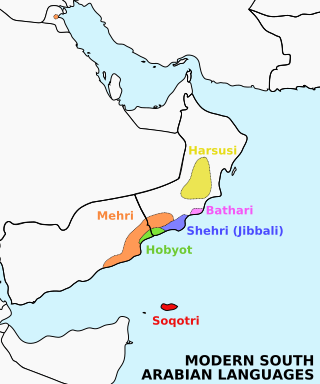
Soqotri is a South Semitic language spoken by the Soqotri people on the island of Socotra and the two nearby islands of Abd al Kuri and Samhah, in the Socotra archipelago, in the Guardafui Channel. Soqotri is one of six languages that form a group called Modern South Arabian languages (MSAL). These additional languages include Mehri, Shehri, Bathari, Harsusi and Hobyot. All are spoken in different regions of Southern Arabia.

Arabic poetry is the earliest form of Arabic literature. Present knowledge of poetry in Arabic dates from the 6th century, but oral poetry is believed to predate that.
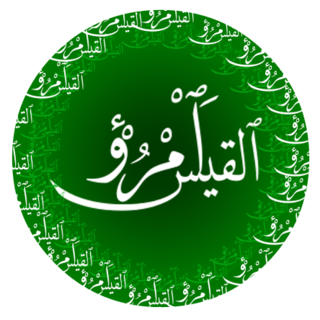
Imruʾ al-Qais Junduh bin Hujr al-Kindi was an Arab king and poet in the 6th century, and also the last king of Kindite. He is sometimes considered the father of Arabic poetry. His qaṣīda, or long poem, "Let us stop and weep" is one of the seven Mu'allaqat, poems prized as the best examples of pre-Islamic Arabian verse. Imru' al-Qais was born in the Al Qassim region of northern Arabia sometime in the early 6th century AD. His father was said to be Hujr bin al-Harith, the Kindite monarchy's regent over the tribes of Asad and Ghatfan, and it is believed that Imru' al-Qais was born in the territory of Asad. His mother was said to be Fatimah bint Rabi'ah al-Taghlibi.

Mehri or Mahri is the most spoken of the Modern South Arabian languages (MSALs), a subgroup of the Semitic branch of the Afroasiatic family. It is spoken by the Mehri tribes, who inhabit isolated areas of the eastern part of Yemen, western Oman, particularly the Al Mahrah Governorate, with a small number in Saudi Arabia near the Yemeni and Omani borders. Up to the 19th century, speakers lived as far north as the central part of Oman.
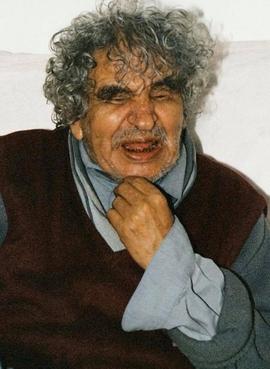
Abdullah Al-Baradouni was a Yemeni writer, poet and critic. He had published 12 poetry books as well as six other books on such topics as politics, folklore, and literature. He is considered Yemen's most famous poet.

Ya'rub is an ancient Arabic personal name. He is the grandson of Abir being the son of Qahtan and the ancestor of the Himyarite and Sabaean kings of Yemen. A similar account places Ya'rub as Qahtan's grandson and holds that he is the forefather of al-'Arab al-'Ariba, who are generally identified with the Qahtanites and its two main tribes, the Himyar and the Kahlan. Some legendary accounts relate that Ya'rub was the first to speak Arabic and that the language was named for him. Shams-i Qais Razi, writing in the 12-13th century CE, traced the origins of Arabic poetry to Ya'rub and he is also credited with having invented the Kufic script.
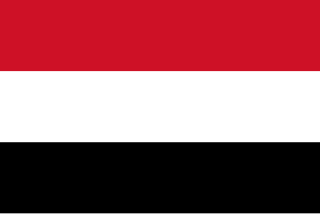
The culture of Yemen has an ancient cultural history, influenced by Islam. Due to its unique geographic location, Yemen has acquired a very distinctive culture from its neighbors, historically and culturally.
Wajdi al-Ahdal is a Yemeni novelist, short story writer and playwright. Laureate of the International Prize for Arabic Fiction (IPAF) in 2008, is known for his contemporary literary style and sometimes socially critical works, some of which have been censored in Yemen. Until 2019, he has published five novels, four collections of short stories, a play and a film screenplay.
Mayfa' Abdel Rahman al-Qiyadi was a Yemeni short story writer and journalist. He studied at the Gorky Institute in Moscow and obtained an MA in 1982. He is known for his short stories which explore the social and political realities of Yemen. His first collection of short stories appeared in 1975, followed by a second one in 1983. His work has appeared in English translation in a 1988 anthology called The Literature of Modern Arabia.
Junaid Muhammad Junaid is a Yemeni poet. He worked as a teacher in Aden. His first book of poetry was called A Garland for a Qaitbani Woman. And was translated into English and included in a 1988 anthology on modern Arabian literature.
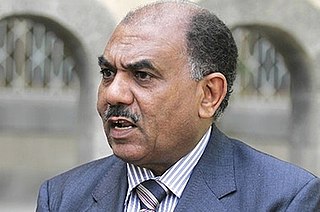
Hasan Ahmad al-Lawzi was a Yemeni politician and writer. He was the Minister of Information.
Abd al-Karim al-Razihi is a Yemeni poet. His first book of poems was titled The Need for a Second Heaven and an Additional Hell. He worked at the Yemeni Ministry of Culture in Sanaa, and edited the magazine Al-Yaman al-Jadid.
Abd al-Majeed al-Qadi is a Yemeni playwright and writer. His work is notable for its engagement with social problems that afflict Yemen. His first two plays were called Al-Daudahi's Daughter and Young Man Mansour. His short story, "The Final Ring", has been translated into English and appeared in a 1988 anthology on modern Arabian literature.
Saeed Aulaqi is a Yemeni dramatist and fiction writer. His story "The Succession" has been translated into English and was anthologized in two anthologies published in the West. As a playwright, he has tackled revolutionary themes and published a number of plays:
Abdulrahman Fakhri was a Yemeni poet and literary critic. He was born in Aden and studied political science at the American University of Beirut. He served as Deputy Minister at the Yemeni Ministry of Justice and later as Adviser at the Yemeni Ministry of Culture & Guidance as well as Secretary-General of the Yemeni Writers Union prior to taking up a position at the United Nations Secretariat in New York from 1978 to 1996. He retired from the United Nations in 1997 and returned to live in Aden, Yemen.

Safa Abdul-Aziz Khulusi was an Iraqi historian, novelist, poet, journalist and broadcaster. He is known for mediating between Arabic- and English-language cultures, and for his scholarship of modern Iraqi literature.
The literature of Bahrain has a strong tradition in the country. Most traditional writers and poets write in the classical Arabic style, contemporary poets that write in this style include Ali al-Sharqawi, Qassim Haddad, Ebrahim Al-Arrayedh, and Ahmad Muhammed Al Khalifa. In recent years, the number of younger poets influenced by western literature are rising, most writing in free verse or prose poetry, and often including political or personal content. Almost all publications of poetry in the country are in Arabic, with poetry rarely published in English without requiring prior translation. Ali al-Sharqawi, a decorated longtime poet, is considered by many to be the literary icon of Bahrain. The country's local writing society, the Bahrain Writers Association, was founded in 1969.
Yemenite Jewish poetry, often referred to as "paraliturgical poetry" because of its religious nature, has been an integral part of Yemenite Jewish culture since time immemorial. The Jews of Yemen have preserved a well-defined singing arrangement which not only includes the very poetic creation itself, but also involves a vocal and dance performance, accompanied in certain villages outside Sana'a by drumming on an empty tin-can (tanakeh) or a copper tray. The Jews of Yemen, maintaining strict adherence to Talmudic and Maimonidean halakha, observed the gezeirah which prohibited playing musical instruments, and "instead of developing the playing of musical instruments, they perfected singing and rhythm." This arrangement was integrated into the walks of life familiar to the Jews of Yemen. The texts used in the arrangement were put down in writing and later included in separate song collections (dīwāns). The social strictures and norms in Yemenite Jewish culture provide for separate settings for men and for women, where the sexes are never mixed. Men’s song usually expressed the national aspirations of the Jewish people, and it was far removed from the singing associated with the Muslim environment, whereas folk songs of Jewish women were sung by rote memory and expressed the happiness and sorrows inherent in their daily life and was, as a rule, closer to that of Muslim women.
Pre-Classical Arabic is the cover term for all varieties of Arabic spoken in the Arabian Peninsula until immediately after the Arab conquests in the 7th century C.E. Scholars disagree about the status of these varieties.